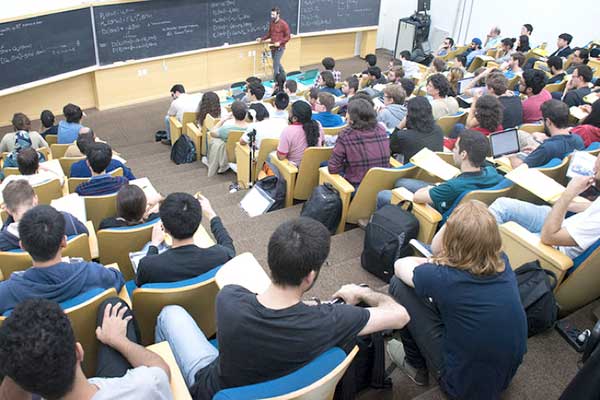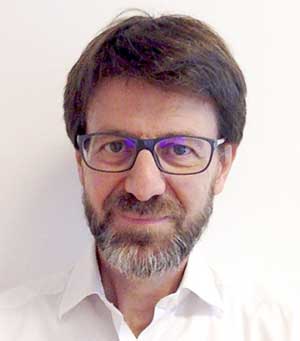A Worldwide Constellation of Theoretical Physics Centers: The ICTP Partner Institutes
By Sandro Scandolo, APS Fellow 2017
Based in Trieste, Italy, for more than 50 years the International Centre for Theoretical Physics (ICTP) has been a hub for scientists coming from all corners of the world. As ICTP’s founder and Nobel laureate Abdus Salam used to say, it offers a safe haven to scientists coming from troubled regions of the world, providing a chance “to recharge their batteries.” During the Cold War period it was one of the few places where Soviet and American physicists were allowed to meet, and after the Cultural Revolution, one of the first delegations of Chinese physicists to be given permission to visit a Western country came to ICTP.
But the world has changed dramatically since those years. China is now a leading country in research, as are Brazil, India, Turkey, South Africa and many other emerging countries. This is good news, especially now that many of the countries that used to receive ICTP support are now ready to give back and act as regional hubs for the advancement of physics. They have borrowed ICTP’s model and experience to create “partner institutes” in their own regions. These international centers replicate the full range of activities that have made of ICTP a successful example of international scientific cooperation.

The lecture hall of the ICTP South American Institute for Fundamental Research (ICTP-SAIFR), Sao Paulo, Brazil, during the “Bootstrap 2017” School and Workshop.
The ICTP South American Institute for Fundamental Research (ICTP-SAIFR), based in Sao Paulo, Brazil, celebrated its fifth birthday a few months ago with a meeting that featured talks by David Gross, Gabriela Gonzalez, and Juan Maldacena. ICTP-SAIFR was created in collaboration with the São Paulo State University (UNESP) and the Sao Paulo Research Funding Agency (FAPESP) and it is situated on the premises of the Instituto de Fisica Teorica (IFT) at UNESP, in the Barra Funda campus of the University. More than twenty activities, including schools and workshops, are being held at ICTP-SAIFR in 2017, on topics ranging from string theory and dark matter, to theoretical biology and data science. High-quality research in theoretical physics remains the main goal of the institute, which has managed to expand its faculty and attract some of the best young theoretical physicists worldwide, the latest one being Portuguese quantum field theorist Pedro Viera. Thanks to the crucial contribution of ICTP-SAIFR’s faculty, UNESP has been recently recognized by Nature as the number one “rising star” among South-American universities.
The Mesoamerican Center for Theoretical Physics (MCTP), located in the southern Mexican state of Chiapas, was created in partnership with the local university, Universidad Autónoma de Chiapas (UNACH) and its geographical reach extends throughout Central America and the Caribbean. Most countries in this region lack PhD programs in Physics, so MCTP’s main aim is to provide a preparatory master’s program for talented students from the region interested in further study in physics.
A similar goal is shared by the soon-to-be-inaugurated East African Institute of Fundamental Research (EAIFR), located in a five-story building on the Kigali campus of the University of Rwanda. In 2018 EAIFR will launch the first master’s program in physics in Rwanda. EAIFR has been developed in response to a need, in Rwanda and the region, for graduate training in various areas of physics, both fundamental and applied. The first Director of EAIFR, Dr. Omololu Akin-Ojo, comes from Nigeria and obtained his PhD from the University of Delaware. He was formerly the Head of Physics at the African University of Science and Technology in Abuja, Nigeria, and was appointed at the end of June 2017.
Turkey’s ICTP-Eurasian Centre for Advanced Research (ICTP-ECAR) is based at the Izmir Institute of Technology and runs a regular series of conferences in its Izmir headquarters, mostly in the area of condensed matter physics.
The next and fifth ICTP partner institute will soon start hosting scientists in the new campus of the University of the Chinese Academy of Sciences on the outskirts of Beijing. ICTP-Asia Pacific will provide opportunities for advanced training, research, and education in theoretical physics and related interdisciplinary areas. It will also be an international hub for high-level conferences, schools and workshops, playing an important role in building strong, self-perpetuating communities in the Asia Pacific region.
Programs at each partner institute are designed with regional needs in mind, but they all take advantage of half a century of experience in running similar programs at the ICTP headquarters in Trieste. Long-term sustainability is guaranteed by agreements that the host governments must sign with UNESCO, of which ICTP is part, to be recognized as Category 2 Institutes of the Paris-based UN organization.
The ultimate goal is to spread scientific excellence in physics and related disciplines in those areas of the world where opportunities to receive high-level training are scarce. But dreams fly high: “I would love to see someone from our institute be the first Latin-American physicist to win a Nobel Prize”, ICTP-SAIFR’s Director Nathan Berkovits declared in a recent interview.
Sandro Scandolo is Head of Scientific Programmes and Outreach at the Abdus Salam International Centre for Theoretical Physics, Trieste, Italy. He chairs the IUPAP Commission on Physics for Development and is a Fellow of the American Physical Society.

